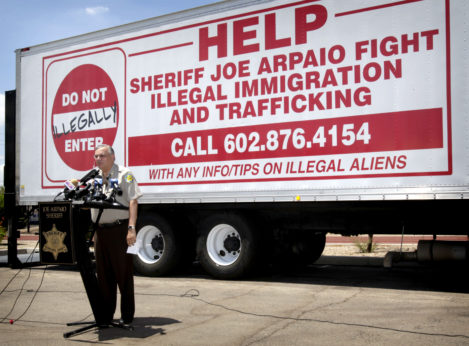
With Hurricane Harvey bearing down on Texas, President Donald Trump announced Friday he was issuing a pardon to Joe Arpaio, former anti-immigrant sheriff of Maricopa County, Arizona. The political move of granting a presidential pardon this early in the criminal justice process is highly unusual. Arpaio’s reprieve was delivered less than a month after he was convicted and before his official sentencing, which was due in October.
The pardon was widely expected, though, after Trump teased that it would come soon during his speech in Phoenix last week. In his address, Trump had predicted, “Sheriff Joe’s…going to be just fine.” The duo share a political allegiance to one another rooted in opposition to immigration and President Barack Obama. In a Twitter response to Trump’s action, Arpaio said, “Thank you @realdonaldtrump for seeing my conviction for what it is: a political witch hunt by holdovers in the Obama justice department!”
The former Arizona Sheriff was a staunch Trump supporter during the 2016 presidential campaign, appearing with the candidate several times. He has even been credited with inspiring the “Build the Wall” chant that became an infamous hallmark of Trump rallies.
The Trump-Arpaio alliance can be traced even further back, however. As sheriff, Arpaio was one of Trump’s many accomplices in the ‘birther’ movement aimed at undermining Obama’s legitimacy to serve as president, a conspiracy stretching back as far as 2011. Shortly after Obama released his birth certificate, Arpaio assigned a five-man “Cold Case Posse” to probe the authenticity of the document. Six months later, Arpaio announced at a press conference that Obama’s Hawaii long-form birth certificate was a “computer-generated forgery.” That’s when Trump took notice. Within a couple weeks of Arpaio’s announcement, Trump had printed out an Associated Press article about the charade and sent a handwritten note praising him for being “the only with the ‘guts’ to do this.”
Apart from his work with Trump, Arpaio has racked up a long record of abusive practices and was charged with violating the constitutional rights of undocumented immigrants over the course of his six-term reign as Maricopa County Sheriff. Arpaio willfully continued racial-profiling traffic patrols for an additional 17 months after U.S. District Judge Susan Bolton ordered that they cease. He claimed the judge’s 2011 injunction, which he was found to have violated, was “vague” and unclearly worded.
In addition to his numerous human rights violations, Arpaio was also notorious for being the innovator behind the infamous outdoor prison, “Tent City.” For over 20 years, the outdoor jail was stationed within a larger compound, in an industrial area, where inmates were forced to live and work in the sweltering Arizona heat. According to Arpaio, it was created as response to the prison overpopulation problem and initially framed the facility as a temporary solution to an overcrowding issue.

The camp was comprised of Korean War military surplus tents that Arpaio sought out, and all inmates were forced to wear pink uniforms as a public humiliation tactic. At it’s peak, Tent City housed an estimated 1,700 inmates, and after 2009, it could hold up to 200 undocumented immigrants in detention as well.
In the midst of the reports surrounding the inhumane and egregious conditions of Tent City, Arpaio dodged any and all critiques by those who probed for further accountability. As sheriff, he launched secret criminal investigations against people who challenged him, including journalists, activists, the mayor of Phoenix, and the wife of the judge who had found his department had engaged in racial profiling.
Since the pardon announcement, Arpaio has expressed his appreciation and support of the president’s decision, stating that his loyalty to Trump would have remain unhindered either way. “I’ve always said regardless of pardon or no pardon, I’ll be with him to the end,” he said.
Meanwhile, Trump has now raised concerns by overturning Arpaio’s charges so prematurely. There is fear that the president has set a precedent for the type of immunity his cabinet, those close to him, or even Trump himself might be awarded should investigations reveal any possible misdeeds.









